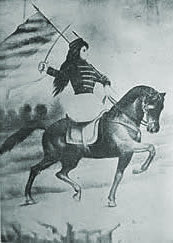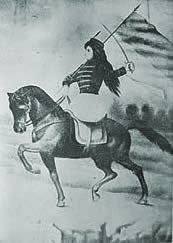
|
Women and Independence in Latin America An exploration of women's involvement in the Latin American Wars of Independence |

|

|
Women and Independence in Latin America An exploration of women's involvement in the Latin American Wars of Independence |

|
Gender:Male
Ethnic origen: White
Events:
| 1751 | - | Lima | - | Not applicable | - | He was born 13 March 1751. |
| 1772 | - | Cuzco | - | Unknown | - | He lived in Cuzco in 1772. He was Secretary to the Archbishop of Cuzco. |
| 1773-1778 | - | Spain | - | Unknown | - | He lived in Spain from 1773 to 1778. |
| 1781 | - | Lima | - | Unknown | - | He made a welcoming speech to the Viceroy. |
| 1806 | - | Lima | - | Unknown | - | He was named Oidor de Lima, 1806. |
| 1814 | - | Spain | - | Unknown | - | He went to Spain in 1814. |
| 1818 | - | Seville | - | Unknown | - | He was confined in Seville, where he died. Clément states his death as January 1817. |
Connections:
BaquíjanoBiography:
Born 13 March 1751, Lima, he was an orator, poet and writer. He made a famous speech in 1781 welcoming Viceroy D. Austin de Jáuregui to San Marcos. In 1783 he went to Spain to represent the Cabildo de Lima. He was affiliated with the liberal party in 1812. He returned to Spain in 1814 arriving just as the reaction to the absolute monarchy broke. He was confined to Seville where he died in 1818. (Romero de Valle, 40)
He was secretary to the Archbishop of Cuzco from 1773-1776, and was named Oidor de Lima in 1806. (Clément, 98-99.)
In his “Elogio” to Viceroy Jáuregui, written at the University of San Marcos, he described the indigenous as “citizens” based on the Natural Law that each individual is “precious and respectable”. In an tone described by Tamayo Vargas as “entre socarrón y atrevido, empleando la misma táctica que Marco Antonio ante Julio César”, and one that seriously comprised his future, he elegantly condemned the repression against the Indians during the Túpac Amaru rebellion: “al indio abatido luchar con los horrores de la suerte e implorar el cuchillo por fin de sus tormentos”. He added, “pero Vuestra Excelencia desprecia a esos partidos”. He confirmed loyalty to the Spanish Crown and said it wasn’t responsible for these crimes because “los monstruos nacen en todos los países”. He sustained, “la gloria y la inmortalidad no se afianzan ni apoyan en los elegios e inscripciones públicas que consagran la dependencia y el temor”. He seemed to recognise the rectitude of the Hispanic authorities, but pointed out before the astonished audience, the crimes committed in its name. He put forward a liberal political theory, exclaiming: “El deja de serlo si se establece y funda contra el voto y opinión del pueblo” and that mejorar al pueblo contra su voluntad ha sido siempre el especioso pretexto de la tiranía.”
He studied in the Real Colegio de San Martín, and the Semanario de Santo Toribio. He lived in Cuzco in 1772 and in Spain between 1773-78 before returning to Lima as Protector Interino de los Naturales and Catedrático de Víspera de Leyes at San Marcos University. In 1781 he sought to reform the University. He was defeated in the 1783 elections for Rector. In 1784 the authorities ordered him to gather up all copies of the “Elegio”. He was considered a leader of the new liberal orientations. He was the first President of La Sociedad Amantes de Peru (1792-93) using the Greek pseudonym Cephalio. From 1793-1801 he was representative of the Cabildo de Lima in Madrid. He was named Consejero de Estado (briefly) 1812 for Liberal Spain. The Limeños went out into the streets to pay tribute to him. Melgar y Sánchez Carrión wrote a poem in his praise and his disciple, José Antonio Miralla wrote "Una breve descripción de las fiestas celebradas con motivo de la promoción del Exmo. Señor Don José Baquíajano y Carillo al Supremo Consejo de Estado". Political events overtook him: he continued to support the liberal cause until his death in 1818 (in Seville). (Tamayo Vargas, 456-460.)
He was a member of the Sociedad Filantrópica (Lima). He did not contribute to any newspaper, but his speeches and opinions were reproduced by several editors. (Martínez Riazo, 66, 67)
He was a member of Amantes del País, he contributed to El Mercurio Peruano in 1790 under the pseudonym Cefalio. He later became Conde de Vista Florida, catedrático de Vísperas de leyes at San Marcos University and a member of the Sociedad Vascongada de Amigos del País. (Clément, 10)
He died in Seville, Spain in 1818,
(Member of the Carrillo family? Related to Catalina Baquijano?)
References:
Clément, Jean-Pierre (1979) Indices del Mercurio Peruano, 1790-1795
Martínez Riaza, Ascención (1985) La prensa doctrina en la independencia de Perú, 1811-1824
Romero de Valle, Emilia (1966) Diccionario manual de literatura peruana y materias afines
Tamayo Vargas, Agusto Literatura peruana